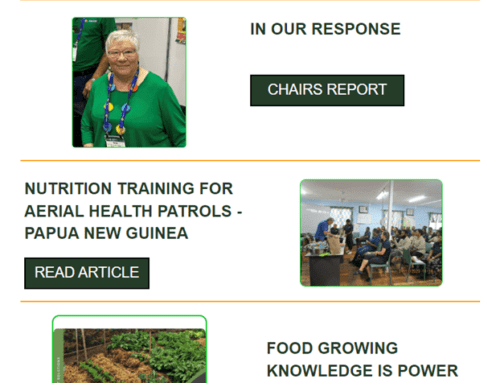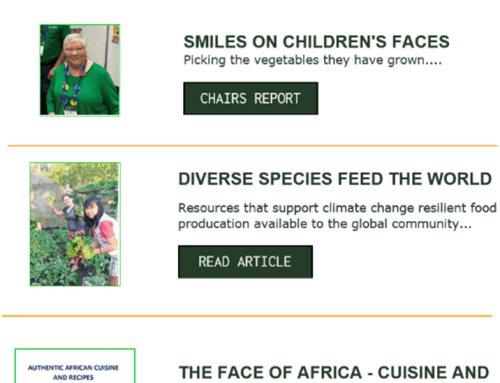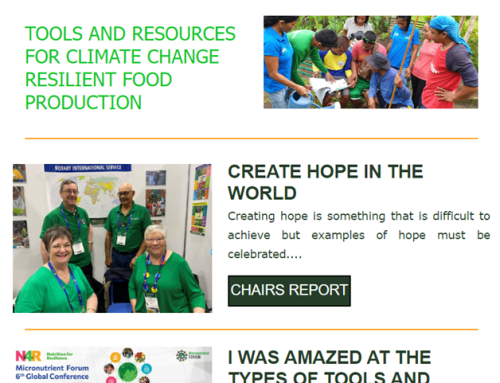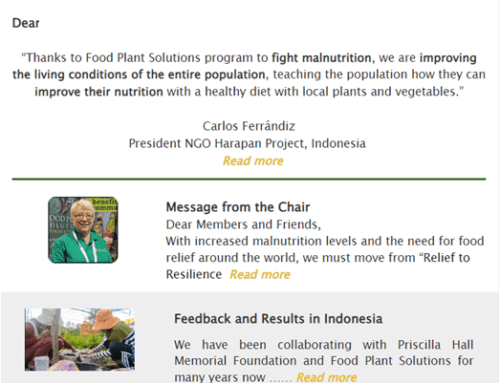Our first edition for 2020! We share exciting developments in the Philippines and an update on Papua New Guinea, plus much more!
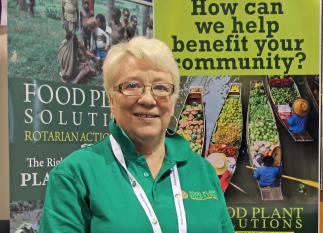
Message from the Chair
“The great thing in this world is not so much where we stand, as in what directions we are moving” Oliver Wendell Holmes Sr. For Christmas I was given a small set of quotes for my desk and this one seemed to me very relevant as to where we are moving in the year ahead.
Happy New Year to you all. I hope you have had a great start to the year.
I sit here writing this, looking out at my vegetable garden and hear in the background, today’s news of the fires that are still burning in Australia. I cannot imagine what all those people who have lost their homes, schools and their livelihoods must feel. I know that as Rotarians, we will be helping our clubs and communities to start again after these fires. Maybe, after helping with the immediate needs, we could help by building a community garden in each town, so that families have fresh vegetables, and not have to add a veggie garden to the long list of the things they need to do. We could help you do this, please contact us for more details.
Most Rotary Clubs in the areas where fires have been, and outside the immediate area will be supporting the RAWCS fundraising for their communities. But please also give FPS a thought, as we have numerous requests from around the world to develop education materials for communities, who also want to feed their families nutritious food.
If you feel you would like to be part of our committee, we have a list of skills listed later in the newsletter.
Yours in Rotary in the year when “Rotary Connects the World”
PDG Una Hobday OAM, PHF
Chair – Food Plant Solutions RAG

FPS in the Philippines – STOP THE PRESS!!!
RID Rafael Garcia 111 (Raffy) has joined the FPS committee
We are delighted to announce that RID Rafael Garcia 111 (Raffy), has accepted a position on the Food Plant Solutions Project Committee, as the Philippines Rep. As you are aware, we have been working with the Muravah Foundation in the Philippines to develop educational materials so that they can develop gardens. Raffy would like to see this in all Barangays in the Philippines.
Celia Giay, past RI Vice President congratulates FPS
“CONGRATULATIONS!!
It is a great news the creation of four picture guides for your program partner in the Philippines because the publications are excellent and SO COMPLETE!!”
FPS Philippine partner (Muravah Foundation) thanks FPS – Sarah Beltran-Fabula
On behalf of Muravah Foundation, I would like to extend our deepest appreciation for the untiring support of Food Plants Solutions to provide knowledge and education on local food sources to poverty-stricken communities such as the Philippines. It is a great honour for Muravah to be partnering with an international organization such as FPS. The learning tools that you provided are very informative and beneficial to the members of our community. With these tools it will be easier for us as grassroots workers to design programs that will help us combat malnutrition and provide our people with ideas on how to sustain our food supply.
This garden was established in accordance with the FPS Food Guide. As of this time we have 23 plant varieties found in this garden. There are 12 families that will benefit in this garden with approximately 57 family members.
Get on board – join us today
More and more people, organisations and institutions are recognising the benefits of our approach, because it changes lives, it’s proven to work, it stops hunger and malnutrition, it can end the obesity epidemic and it’s cost effective.
Contact us now: info@foodplantsolutions.org
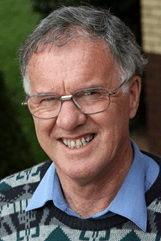
Evergreen Revolution – Bruce French AO
Many organisations had programs and goals heading towards 2020, as it was a catchy title. Now they are starting to use 2030 or even 2050. The trend remains that global food production is still increasing but hunger and malnutrition (including obesity) remain major global problems. There is enough food in the world, but it tends to be the wrong food and in the wrong place. The key issues are related to low quality diets and lack of diversity. Usually for the world’s poor, availability is a problem but when imported foods are provided the price is high and it is usually over-refined foods such as white flour or white rice. This ends in the anomaly that the rich become obese and the poor continue to suffer under-nutrition.
A part of the dilemma is that many research workers continue to put more faith in technology rather than ecology. The negative effect is that hi-tech agriculture is considered to contribute 22% of the global climate change. Currently our database has over 31,300 edible plant species. But this total number is only a part of the goal. The mindset of people needs to change to embrace a diversity of food plants. For example, in Britain many indigenous edible plants are foraged and supplied to elite restaurants in London. The same plants now occur in my home state of Tasmania and are considered “weeds” to be sprayed.
Meat can only ever provide a supplement to diets given the global population and increasing land pressure but scientists are continually amazed at how nutrient rich many of these traditional and ignored local plants are. People such as Dr Swaminathan and others continue to call for an “Evergreen Revolution” that is more appropriate for the planet.
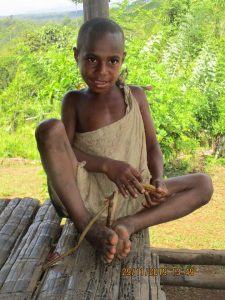
Alleviation of Malnutrition in PNG – Global Grant Update – Dr Russ Stephenson
November fieldwork started with a week’s visit to Huiya Village, a high altitude location adjacent to the Southern Highlands. The aim was to reinforce messages in a workshop about the importance of good nutrition, particularly for pregnant and breast feeding mothers, their babies and young children. A demonstration garden of nutritious corn, snake bean and peanuts was also established. Similar work was carried out during visits to Mubumanibi and Negedei Villages. At Huiya, workshop participants hosted a feast, entry to the feast was by ticket only, a decision by those who attended the workshop. Villagers who did not attend the workshop were not invited!
A practical women’s fellowship baby food preparation workshop for healthier, stronger, smarter babies was held at Mougulu and was attended by 61 participants from 23 different villages, exceeding expectations. The aim was to help women to improve the lives of their babies and children by preparing many different kinds of nutritious, soft foods. Since many women do not speak English, the workshop manual was written in both simple English and the local Bedamuni language, and workshop interpreters were used.
Whilst in PNG I had a meeting with the National Department of Health, who were supportive and appreciative that I teach lessons which are consistent with the National Nutrition Policy.
It would be wishful thinking that this is going to happen easily. Even though people now understand the benefits to their women and children, it involves a lot of extra work for them to grow the additional nutritious food needed. Most people do not even have a shovel to dig their gardens. They use a piece of timber with a sharpened end to till the soil. It is hard work!
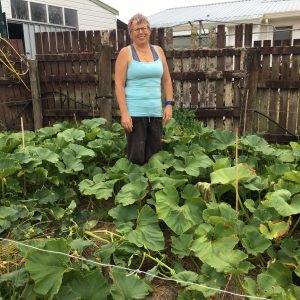
Volunteer Profile – Lyndie Kite – Technical Support Specialist
I was first introduced to Food Plant Solutions/Food Plants International through Rotary when I heard them speak at a Conference in 2012. Having had 18 years’ experience working in the ornamental horticultural industry in NZ and being a very keen vegetable/fruit gardener myself, I felt this was an opportunity for me to give to communities in a practical way.
When I first started volunteering for FPS I was working full time and was still able to have the time to produce Draft Manuals as required. As I moved towards part-time work and then not working at all, I have been able to contribute more time to FPS.
I have learnt a lot producing the manuals that Food Plant Solutions provide to communities – both from a technical point and by increasing my own knowledge of, and the nutrition available from food plants, and about many other countries, mostly in developing parts of the world. All the communities we help have high rates of malnutrition, child deaths and illnesses – all of which can be reduced through adequate and appropriate nutrition, provided by food plants that grow naturally in these communities. The work we do, gives the people of these communities the skills to provide for themselves. I find this very rewarding and to see the impact our manuals have in the communities they are used is very satisfying.
Volunteers Needed
The demand for our services continues to increase and we now urgently require assistance for the following roles:
- People with experience in Microsoft Publisher, to help us format / edit publications. Eye for detail is critical.
- People who can present a PowerPoint presentation about us to clubs. PowerPoint provided.
- People who would like to integrate FPS into an existing project.
- People who would like to attract volunteers for us.
- People with marketing experience, to assist in the promotion of FPS.
- Person to manage social media.
- People with experience in crowdfunding.
- And, if anyone has a skill or interest not listed above, please make contact with us info@foodplantsolutions.org

